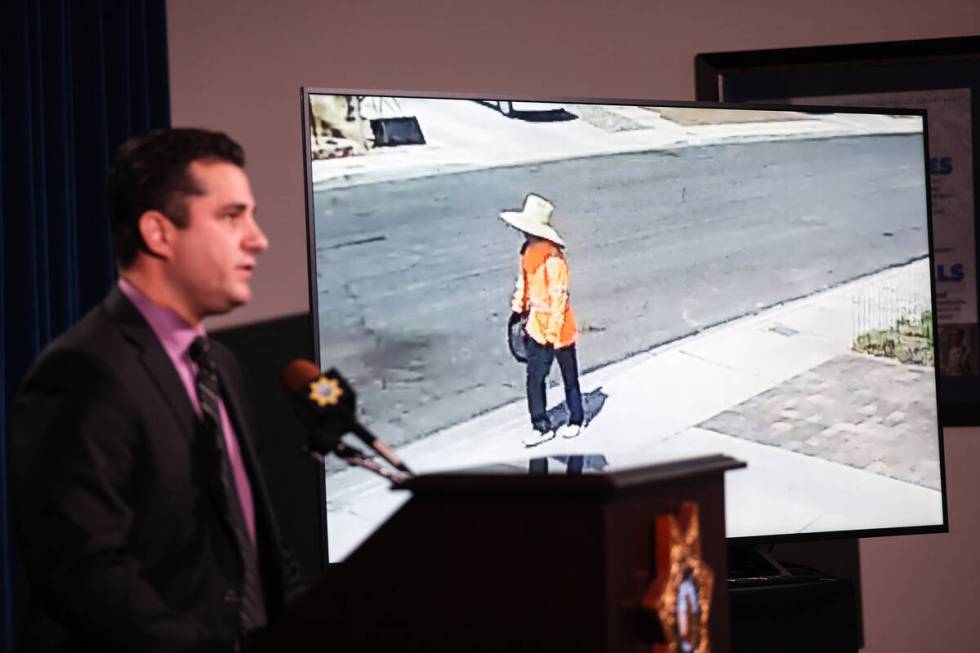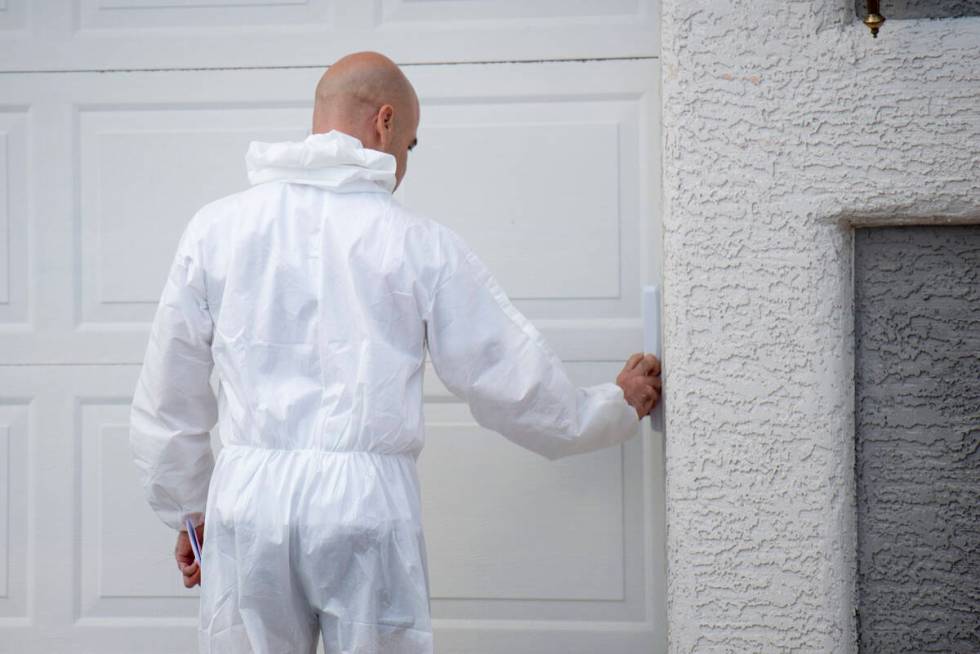
How Jeff German’s grieving Review-Journal colleagues covered his murder
The silence is such that a whisper could pass for a shout.
The police scanner, which looks like a big black walkie-talkie or one of those brick-sized cellphones from the ’80s, sits on the upper lip of a cubicle, volume turned up.
It’s become the center of attention, the axis upon which this evening spins.
When it speaks, everyone else stops.
Clustered in chairs, perched on desktops and sitting on the floor, a small group of reporters and editors hang on every word that crackles from the device, using the staticky, intermittent radio traffic of police officers to transport themselves to 9624 Spanish Steps Lane.

It’s Wednesday, Sept. 7, and police have surrounded the home of Robert Telles, a lawyer, the elected Clark County public administrator — and a murder suspect.
He’s accused of stabbing to death Jeff German, 69, a decorated Las Vegas Review-Journal investigative reporter and oft-admired colleague of those gathered here, who await the apprehension of the man suspected of ending the life of their friend.
They go quiet as the scanner does the opposite. “We’re going to breach the front door, attempt to make contact with our target inside,” an officer says.
A code red is declared; a series of shrill beeps announce themselves every seven seconds on the scanner as a result.
It’s the sound of action being taken.
Five days after the brutal death of a journalist, four days after his body was found, three days after most of his co-workers learned of his violent end, everything has built up to this, all the hours spent canvassing neighborhoods in 100-degree heat, poring over photos for clues and forgetting what sleep’s like.
The suspense isn’t just thick, it’s borderline suffocating, like trying to breathe underwater.
Authorities advance on the house.
The police scanner isn’t that loud, but it might as well be screaming.
“Detectives are inside.”
A shockingly fierce assault
“I hope you’re right.”
Those four words were among Jeff German’s very last.
On the morning of Friday, Sept. 2, German was texting friend and former Review-Journal Sunday Editor Darin Bunch about the R-J fantasy football league’s upcoming draft.
An avid Green Bay Packers fan, German was messaging Bunch about keeping a running back from his favorite team, AJ Dillon, on his fantasy squad.
“I think it’s a good gamble,” Bunch noted, before German sent his final text at 11:13 a.m.
Minutes later, German was ambushed outside his home by a killer in waiting, stabbed seven times in his torso, arms and hands.
He fell to the ground, left for dead.
The shockingly fierce assault ended the life of one of Southern Nevada’s most distinguished journalists.
Beginning with his coverage of organized crime here in the late ’70s, German developed a reputation for going after big targets with even bigger stories, first at the Las Vegas Sun and later at the R-J, where he was hired in 2010.
From his pace-setting coverage of the death of gaming executive Ted Binion, which spawned his 2001 book “Murder in Sin City: The Death of a Las Vegas Casino Boss,” to the outlandish spending habits of the Las Vegas Convention and Visitors Authority nearly two decades later, German was skilled at hitting journalistic bull’s-eyes.
Starting in May, Telles was the subject of a series of stories by German chronicling accusations of employee bullying, fostering a hostile work environment and engaging in an inappropriate relationship with a co-worker. His employees captured Telles, 45, on camera in the backseat of a car with the woman.
The next month, Telles lost his re-election bid in the Democratic primary.
German wasn’t done investigating him, though: He filed more public records requests involving Telles’ office in July.
Telles lashed out at German on social media — “Typical bully,” he tweeted of German on June 25. “Can’t take a pound of criticism after slinging 100 pounds of BS” — and vented with angry posts published on his campaign website.
“You can just see in that, that he is so frustrated,” Review-Journal Assistant City Editor David Ferrara observes of Telles’ outbursts. “He even says, ‘I thought about suing them and that’s not an option,’ because, obviously, there was nothing for him to sue over, because Jeff was reporting the truth.
“He just can’t figure out how to get rid of Jeff.”
‘Jeff’s dead’
He was busy helping his son with his homework early on a Saturday evening when the call came in.
And so R-J Executive Editor Glenn Cook dialed Clark County Sheriff Joe Lombardo back a few minutes later.
“I’m calling about Jeff German. Do you know why I’m calling about Jeff?” Cook remembers Lombardo saying. “I said, ‘Is it about a story he’s working on?’ And the sheriff tells me, ‘Jeff’s dead.’”
Lombardo explains that a neighbor called 911 that morning after discovering Jeff’s body, which had been lying undetected along the side of his house.

Lombardo also informs Cook that German’s body “was pretty scratched up,” so foul play couldn’t immediately be ruled out.
Cook helps provide Lombardo with German’s next-of-kin information, then begins reaching out to a small circle of R-J supervisors.
One of the first people Cook called was Rhonda Prast, head of the R-J investigative team and German’s boss.
“The first thing I thought was that it was a health issue: heart attack, stroke,” remembers Prast, who was at a friend’s house when she got the news.
Crying, overcome with grief, she waited 25 minutes before driving home around 9 p.m., where she looked up German’s address in order to take his family flowers the next day.
Shortly thereafter, Prast noticed an email from the Las Vegas Metropolitan Police Department announcing a press briefing at 10 p.m. that night addressing a homicide in the area of Bronze Circle and Wintergreen Drive in the northwest part of town.
Bronze Circle?
It sounded familiar to Prast for a reason: As she had just discovered, that was the street German lived on.
Prast called Cook immediately.
She could barely believe the words she was about to say.
“I think Jeff may have been murdered.”
A death becomes a murder
Jeff German made a living making people mad.
Exposing corruption tends to enrage those exposed — and exposing corruption was Jeff German’s thing.
So when the coroner ruled his death a homicide, some of his co-workers immediately began to wonder if it was a result of a reporting-based grudge.
“It seemed very real that his death could have been related to an investigative piece,” says Deputy Metro Editor Marian Green, who helped oversee the story breaking the news of German’s killing, which was published at 12:48 a.m. on Sunday morning, Sept. 4.
Cook directed Prast to provide him with details of German’s current projects and the names of those who might have an ax to grind with him. Anything that could help police generate a lead.
Robert Telles was one of the names.
Still, not everyone initially believed that German’s death was a targeted killing.
German’s friend and fellow investigative team member Art Kane was among those skeptical of the theory at first.
“A hit would happen at night with a gun,” Kane remembers reasoning. “That’s the more professional way of doing it than, you know, a knife in the middle of the day. That just sounds like a robbery. Or something personal.”
Police initially thought it was a robbery gone south as well, as a source close to the investigation indicated to Kane.
But there were incongruities: In Metro’s first official statement on the murder, they described it as an isolated incident; they’d subsequently claim that the suspect cased the neighborhood.
Then, on Monday, Sept. 5, at noon, Metro released a picture of the suspect, a surveillance image of a person in a wide-brimmed straw hat, orange reflective long-sleeve shirt and jeans carrying a dark shoulder bag.

“When they released the photo of that suspect walking with a duffel bag, dressed like he was working outdoors or maybe lawn care or construction or something, I was like, ‘Oh, that’s a burglar,” says reporter Michael Scott Davidson, who also works on the R-J investigative team. “Because if it was a hit, if it was someone lashing out at Jeff, we were kind of saying that they wouldn’t be so sloppy.”
Breaking news and crime reporter Glenn Puit agreed with Kane and Davidson that his co-worker’s death didn’t seem like a hit.
“I thought it was unlikely,” Puit says. “Could it be? I suppose. When I saw the suspect photos, it looked like it was along the lines of what the police were saying, some random burglar.”
A burglary debunked
After 30 years, it was his last week on the job before starting a new corporate communications position.
“And this is the story that I’ve covered — and it’s probably the most important story I’ve ever covered,” Puit says. “And I’ve covered a lot of them.”
Puit first encountered German covering the Binion case for the R-J in the late ’90s while German worked for the rival Las Vegas Sun.
“Almost every day there was a story by Jeff German about a new fact that changed everything,” Puit recalls. “I took a journalism beat-down from him for months — we all did on that story. And it was painful, getting beat that badly. I really came to admire him for it.”
So when Cook reached out to Puit the morning of Sept. 4 to help cover German’s death, Puit didn’t hesitate.
“Every moment that I worked on this story, I’m like, ‘I’m doing this for Jeff.’ Knocking on 80 doors in 105-degree heat? I’m doing this for Jeff, man,” Puit said.
It was while knocking on those doors with police reporter Sabrina Schnur, on Labor Day in German’s northwest valley neighborhood, looking for anyone who might have seen something related to the attack, that he began to view the case in a different light.
They both did.
After closely examining the suspect’s picture, Schnur noticed the landscaping in the far right corner of the photo.
She drove around until she found it.
Here’s the thing: It was a long, winding walk from where it was located to German’s house, a strangely circuitous route for a would-be thief to take.
“That felt very odd based on burglary tactics,” Schnur says. “He walked by 75 houses, some of them were nicer, some of them had fewer cameras around them, some of them looked more empty.
“It was very odd why he’d pick German’s house,” she continues, “especially because, diagonally across from it, is a house that’s like Fort Knox. There’s like a camera on every single side that would have captured some of this.”
Puit began sharing her doubts.
“You have to go up to the cul de sac, you’re exposing yourself to like 15-20 more houses that probably have ring cameras on them,” he notes. “And that’s when I started to go, ‘You know what? I’m not sold on this idea that it’s a burglar.’”
Neither was Ferrara.
‘It can’t be this obvious, can it?’
For years, he shared a closet-sized office in the Regional Justice Center with Jeff German.
Carri Geer worked with German as a fellow court reporter as well.
Together, Ferrara and Geer, now the Review-Journal’s Metro editor, played a crucial role in identifying his suspected killer.
When police released the suspect photo, Ferrara and some of his friends and fellow journalists from around the country began comparing the picture with photos they found of Telles on Instagram.
“His gait was the same. His stature was the same,” Ferrara says. “We looked at just the way he was standing, this stance in the suspect photo, it was this narrow stance that matched the photo of him, a full body shot of him on Instagram.”
Then Ferrara drove to German’s neighborhood and noticed that there was construction going on nearby, explaining the suspect’s disguise during the murder.
“If it happened around late morning on Friday,” Ferrara theorizes, “if he looked like a construction worker and he was just walking around the construction zone, it could have looked like he was just knocking off for lunch or he was knocking off early for the holiday weekend or whatever and he was walking back to his truck.”
On Labor Day, in the afternoon, Ferrara began texting Geer about Telles potentially being a suspect.
“I’m being skeptical,” she remembers. “I think I’m using my reporting instincts, like, ‘We have to have an open mind. Don’t rule anything out.’
That same day, Ferrara made his case to Cook at a chance encounter at a Summerlin gym, where both are members. Yeah, Ferrara’s the kind of journalist who takes his laptop to the gym.
“We’re both pretty fried,” Cook recalls of the long hours they’d already put in by this point, “but I come and sit down with him in the gym cafe, and David is just laying it all out: ‘It’s this guy. It’s Telles.’
“He’s got the photo up,” Cook continues, “he’s talking about the physical size of the killer. He’s looking at the Metro photo, just the posture of the person, and he’s found these photos on the web of Telles, and the posture’s very similar.”
And yet, Cook still wasn’t wholly convinced.
“Once Metro circulated that first photo, there’s all kinds of stuff flying all over social media, and I’m trying to remind people that, ‘Hey, we honor Jeff by sticking to the facts,’” he explains. “And so, as David is laying out, piece-by-piece, why Telles could be the killer, I’m thinking to myself, ‘We’ve got to be careful.’
“But after an hour of sitting with David,” he continues, “I leave that table, and I’m asking myself, ‘It can’t be this obvious, can it?’ ”
The bombshell
Ironically, it was the getaway vehicle that proved to be the crucial piece of evidence in preventing an accused killer from getting away.
On Tuesday, Sept. 6, police released pictures of the suspect’s car, a maroon GMC Yukon with chrome handles.

And then one of Ferrara’s friends delivered a bombshell: He found a Facebook picture capturing Telles and his family gathered around their SUV at a trunk-or-treat event.
It was a maroon GMC Yukon.
Then someone did a Google Street View search of Telles’ address.
A matching vehicle was in the driveway.
“I just got chills,” Geer says when Ferrara shared the discovery with her. “For the first time, I started to think he might be right.”
Cook was in his office at the time and came out for an update.
“I go over to the Metro desk, I approached Carri Geer, and she says, ‘It’s Telles’ car — his car,’” he recollects. “David holds up his phone, he’s showing me the picture of the car on the phone. And Carri tells me, ‘We’re on our way. We’re going to his house.’”
R-J Director of Photography Ben Hager arrived at Telles’ home around 6 p.m., joining reporters Katelyn Newberg and Brett Clarkson, who were already there.
He couldn’t believe what he saw.
“He was just outside washing his cars,” Hager says, “just like nothing was going on, but over-the-top, like, sunglasses on, jeans on in 100-degree heat, tucked-in polo shirt, and he was just washing each car. And then he really slowly started working on his second vehicle” — the SUV that matched the description of the suspect’s vehicle.
Though he didn’t have the proper camera lens with him, Hager got some photos of Telles and the SUV from afar.
Cook instructed the trio to keep their distance from Telles.
“We’re monitoring this,” he says, “and everyone in the room at that point is digesting the fact that this person who Jeff wrote about very well might have killed him. My guidance is reminding everybody, ‘Remember, this is a man who could be a suspect in the murder of your colleague. This is not a safe situation. Do not approach him. Don’t talk to him. And don’t be seen.’”
When Hager arrived on the scene, it quickly became apparent to him that police were also keeping tabs on Telles.
“They were in all sorts of undercover cars all over the neighborhood, which was just surreal when you pulled up,” he remembers.
At 6:40 p.m. Newberg got a call from Geer.
“Carri said, ‘Hey, we’ve heard from the police that Metro has eyes on Telles, and they want the reporters to get out of the neighborhood,’” she recalls.
Although R-J staff already were a fair distance from Telles’ house, they pulled back farther. “We weren’t going to be the ones who screwed up the investigation into a suspect in Jeff’s killing,” Cook said. “We weren’t going to be the ones who sent a suspect fleeing to Mexico. And, absent an official law enforcement action, we couldn’t report what we were seeing without risk of libel. So we waited and watched.”
A story of a search warrant being executed at Telles’ house, explaining Telles’ connection to German, is pre-written Tuesday night so the R-J can quickly break the news if it happens.
R-J reporters watch over Telles’ house until midnight, then return at 6 a.m. the morning of Sept. 7.
Everyone is on edge. At 6:30 a.m., police move in to search Telles’ home and property. The R-J’s story is posted online.
And with that, the world suddenly knows what the R-J newsroom has grappled with for more than half a day — that a sitting elected official is a target of a police investigation into the killing of a journalist.
Police close in
The police scanner is crackling again.
“Just so everybody’s aware, there’s media inside of the neighbor’s residence,” an officer says. “They’re going to be recording everything we do.”
It’s after 6 p.m. on Wednesday, Sept. 7. R-J reporters and photographers have been in Telles’ neighborhood all day. Police have come and gone and come again. The maroon Yukon has been towed. And Telles has returned home after being interviewed by police.

Review-Journal photographer Kevin Cannon is crouched down against a wall in the backyard of one of Telles’ neighbors on a normally quiet street in Peccole Ranch.
He gained access to the house by befriending the home’s owners when he arrived on the scene.
He’s flanked by Clarkson 10 feet away.
Police have cordoned off the area with crime tape and surrounded Telles’ home. All other media are outside the tape.
They’ve been huddled here for hours now.
“It was like being in a foxhole,” Cannon recalls. “We could hear everything. I kept down because I didn’t want to blow my cover until they started bringing him out. So I was down the whole time. I couldn’t see anything.”
Clarkson monitors the scene with a periscope lens on his cellphone.
Police spot the two eventually, as the scanner indicates, but they’re on private property and aren’t forced to leave the area like other media members, who were moved back earlier when police expanded their perimeter around Telles’ house.
Back in the office, reporters get a blow-by-blow over the airwaves.
“There’s probably a dozen of us gathered, just listening to the scanner,” Schnur recalls. “And for 3½ hours, we sat there just listening to it.”
At 6:22 p.m., they hear that Telles is in his bathtub, bleeding.
He’s stabbed himself multiple times.
A murder suspect captured
Around 6:30 p.m., Cannon gets the look from Clarkson: It’s time.
There’s a personal element to all this for him: Cannon photographed Telles while German interviewed him, shooting and filming the man who would later be accused of his murder.
When Cannon learned of German’s death, he immediately thought of Telles.
On Sept. 6, when police released video footage of the suspect walking, Cannon compared the video clip to footage he’d taken of Telles during said interview.
It was him. He knew it.
“It looked just like the walk that I got of him for B-roll in his office that day,” Cannon says, referring to the video footage he shot.
Now, the photographer swings to his feet upon Clarkson’s cue.
As Telles is being loaded into an ambulance, Cannon gets the shot.
While all this is happening, Cook gets another call from the sheriff.
“The sheriff tells me, ‘Glenn, I’m calling to let you know that Robert Telles is in custody and under arrest in connection with the homicide of Jeff German.’”
Cook walks down the row of reporters huddled around the scanner with his phone in the air, breaking the news.

A cheer erupts — but only a short one.
There’s work to do, and quickly: The story on Telles’ apprehension is updated and posted online in 90 seconds.
It’s the culmination of days of near around-the-clock reporting.
Shortly after the first photos of the suspect were released on Labor Day, R-J staffers began hammering their law enforcement sources with their findings on Telles. Those contacts continued immediately after the Sept. 6 release of the video footage of the suspect walking and the photo of the SUV, when police Capt. Dori Koren told an afternoon news conference, “We do need the public’s help.” (The Review-Journal staffers who contacted law enforcement with information about Telles are not being identified here to better protect the identities of their sources.)
After all was said and done, though, it still didn’t feel quite real to Geer.
“There were times when I was editing the story, even where I would stop and say, ‘I can’t believe this,’” she says. “You’re so focused on the words, and then you just sit back, like, ‘Are we really writing this story?’ We’ve seen all these bizarre true crime stories, but I’ve never seen anything like, never experienced anything like this.”
Looking for answers. Finding anger
Even with a murder suspect behind bars, the killing of Jeff German remains as hard to fathom as he was hard to shake from a story.
“Was Jeff really killed by this man over an investigation that found no criminal wrongdoing by Telles, but certainly improper behavior, unprofessional behavior, very poor management, etc.?” Cook asks incredulously. “Jeff hadn’t uncovered multiple felonies. … The complaints were just that this is bad guy who treats his employees terribly.”
There’s a sting, a particularly potent sense of injustice, that German, according to court documents, suffered so harshly for someone else’s alleged misdeeds.
“That is an act of violence against what is right,” Puit says. “The thing that bothers me a lot about Robert Telles is that he blamed Jeff. Who’s to blame for this? It’s Robert Telles.
“Quit projecting all your misery on other people,” he continues, his anger palpable. “Take responsibility for your actions. You’re the one in the backseat of a car with your employee. That’s Jeff’s fault? Be accountable for your own behavior. That bothers me, man, that he would project all this on Jeff.”
Prast fights back tears when speaking about German a week after his death.
“I feel guilty,” she says. “Did I warn him enough? Could I have done something?”
“Grief, anger. Grief, anger,” she continues. “I think it’s gonna take a long time to process it.”
German’s murder registers not only as an attack on a friend, but also on their very profession, on journalism’s fundamental role of fighting to ensure that those with power don’t get away with abusing it.
“It feels really personal to have this happen to our colleague for doing his job, for simply doing what he thought was right — and what he had always done: telling the truth,” says reporter Briana Erickson, a member of the R-J investigative team.
Following German’s murder, she’s spoken to some of Telles’ former employees, who reached out to German for help in calling attention to their plight.
“When I called his sources, they said the same thing: They owe Jeff everything, because for the last two years of their lives, they’ve been in this hostile workplace environment, dealing with someone who hated them,” she says.
“But the county had not heeded their concerns,” she adds, “and out of desperation, they wanted to talk to Jeff to raise awareness, and he kept asking questions to get to the bottom of what was going on in that office.”
‘Jeff was a lifer’
She drove to four different gas stations looking for flowers.
No luck.
It tore her up inside.
On Tuesday, Sept. 5, when the staff returned to the R-J newsroom for the first time since German’s murder after the Labor Day holiday, Schnur couldn’t stand the thought of an empty desk where her slain co-worker once sat.
“I wanted to make sure he was really honored — and it didn’t look lonely,” she says. “I just kept thinking about how he was out there by himself — alone — and that just made me so upset.”
When she couldn’t find any flowers, she called education reporter Lorraine Longhi in a panic, asking her if she could bring some in.
Longhi told her that a number of people had beaten her to it.
“She goes, ‘Sweetie, there’s flowers there,’” Schnur says. “’So many people put flowers up.’
“I went by his desk and I saw the flowers,” she continues, sobbing now. “It just felt so good that his desk wasn’t empty. It was just so important to me that as people came back they see love and not loneliness.”

German’s desk remains covered in tributes — a mini football commemorating his R-J fantasy football league championships; a framed copy of the front-page investigation on the Las Vegas Convention and Visitors Authority that he helped write in April 2017; all those flowers.
“Jeff was a lifer,” Cook says. “He loved his job. He loved getting the big stories. He never mentioned retirement to me.
“I think he was gonna do this job literally ‘til he took his last breath,” he posits. “And he did.”

German’s gone, but not silenced: His voice lives on in season two of “Mobbed Up: The Fight for Las Vegas,” the R-J true crime podcast, which he wrote and narrated.
“I’m Jeff German,” he says at the beginning of each episode, “an investigative reporter with the Las Vegas Review-Journal.”
Contact Jason Bracelin at jbracelin@reviewjournal.com or 702-383-0476. Follow @jbracelin76 on Instagram
Article written by Jason Bracelin #ReviewJournal












